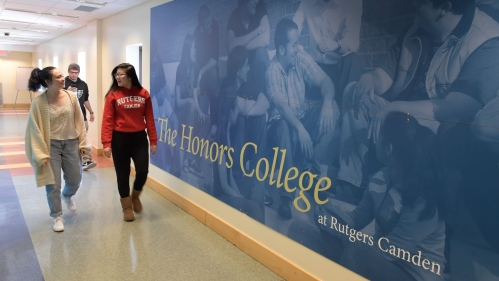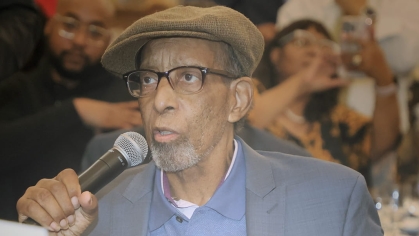Rutgers–Camden’s Honors College Marks its 25th Year.
There’s a good chance that Jerry Pinkerton and Amber Jagielski could have spent four years on Rutgers–Camden’s compact campus and never crossed paths.
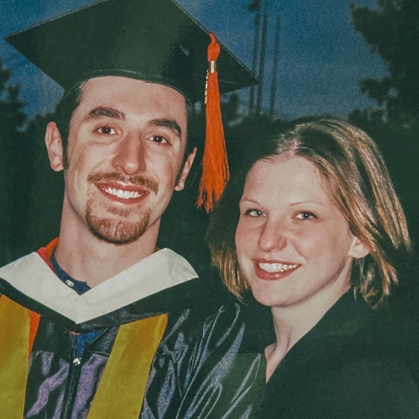
He was a biology major and she was studying business. His classes were in the morning, hers in the afternoon. But in the fall of 1997, they would meet in a first-year Honors College seminar, and they were dating by the end of the semester. They would go on to participate in the same volunteer programs and attend Honors College field trips together. By the time they graduated, they were engaged, and a year later, they were married. “I don’t think we would have had a class together if not for the Honors College,” says Amber SBC’01, who has worked as a financial analyst and accountant.
Jerry CCAS’01 has only good things to say about the Honors College program, which provided him the outlet to meet his future wife and set the groundwork for his career as an emergency room doctor. “There was a real sense of camaraderie, like you were part of something that was special,” he says.
Members of the inaugural class of Rutgers–Camden’s Honors College, the Pinkertons, who live in Williamstown, New Jersey, represent the kind of motivated, civically engaged, and high-achieving students that the program has produced over the last quarter century. Marking those 25 years of achievement, the university is planning a day of events on March 22 to celebrate the Honors College.
Expanding Student Horizons
Each spring, Honors College administrators cull through the SAT and ACT scores, GPAs, and advanced placement and honor courses of accepted Rutgers–Camden students, identifying between 80 to 100 candidates whom they invite to join the program as incoming first-year students. In addition, roughly 25 rising sophomores recommended by their professors or who complete an application are invited to join the Honors College, and a small group of transfer students are accepted each year as well. Students must take five courses in the Honors College throughout their four years, plus participate in honors events and campus or community service activities each semester.
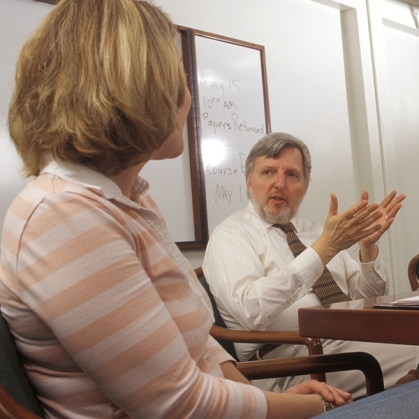
The goal, says Lee Ann Westman, Honors College director since 2019, is to provide an enriching experience in an intimate setting. “We’re asking them to be more intentional about their college experience,” Westman says. “We’re encouraging students to do things they might not otherwise do. They only have four years, and we want them to jump in with both feet right away.”
The Honors College was first conceived not only to attract a higher caliber of students to Rutgers–Camden’s campus, program founder Allen Woll says, but also to allow the faculty to teach more appealing courses. "We didn't have to twist too many arms," says Woll, head of the Honors College for its first 15 years. “Professors taught subjects they were interested in or sometimes tried out new courses that might later be incorporated into the regular curriculum. In the seminar setting, students got to know their professors very well. It raised the boat for everyone.”
Woll, a professor emeritus of history who began teaching at Rutgers–Camden in 1975, has generously established the Allen and Myra Woll Scholarship Fund, one of three scholarships that support students in the Honors College.
A Welcoming Home on Cooper Street
When Timothy Martin, an associate professor of English, took over the Honors College directorship in 2012, the growing program housed in the library was looking for a more permanent home. Promised the second floor of 319 Cooper Street, Martin lobbied for a thoughtful redesign of the previous “all cubicle, CIA-like space,” with more windows, transparent walls, and “a general airiness of place.”
The resulting new home for the Honors College on Cooper Street was a resounding success. “It created a real sense of community where the students had a kind of home on campus,” Martin says. “The building was where everything happened: classes, advising, and being friends together.”
The move also helped institutionalize a fully established advising program, which Martin says is one of the most important Honors College offerings. Students meet with dedicated advisers to discuss everything from personal matters to graduate school applications.
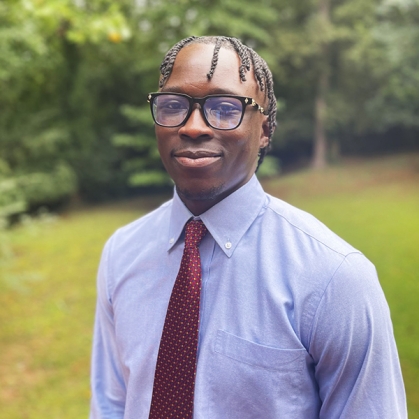
The Honors College's close-knit, seminar-style classes and advising staff have been the most valuable for Jordan Adhiambo, a senior from Atlanta majoring in accounting in the School of Business–Camden who entered the program as a sophomore. Soon after he joined the Honors College, COVID-19 forced most classes online. Still, Adhiambo took solace in his online honors seminar, where he and fellow classmates created a video archive of incidents of police brutality.
The following year, when he was going through a hard time personally, he says the Honors College pulled him through. “I wasn’t in a good head space, and they were very understanding, providing a bridge for me and my professors," says Adhiambo, recently elected president of the Rutgers–Camden Student Government Association. “By the spring semester, I came back strong and have been there ever since.”
High achievers like Adhiambo and his classmate Malaysia Nelson reflect the disproportionate number of prominent positions Honors College students hold on campus, from club leaders to commencement speakers. A political science major from Vineland, New Jersey, Nelson is president of her sorority and B1GS, an organization for first-generation college students.
The college senior also serves as a constituent advocate for New Jersey’s 5th legislative district and has begun applying to law schools. For her, the service requirement of the Honors College was the most attractive element. “I’m someone who loves to serve people,” Nelson says. “And in college, we don’t always think about giving back. You’re held responsible in the Honors College. They’re always pushing you forward, preparing you to take that next leap.”
An Invaluable Network
Beyond the rewarding experience, Honors students earn a few perks: a gold stole to wear over their graduation gowns and an impressive line to add to their resumes. The greatest benefit, though, is the network of alumni they join.
Alice Alfano can attest to the value of the Honors College alumni network. Facing graduation in 2020, Alfano learned that Becky Holloway CCAS’02, a member of the Honors College’s second graduating class, had reached out to the program to say she was “looking for a rock star in marketing” for her start-up company. She was given Alfano’s name. This fall marked Alfano’s second anniversary of working for Malbek, a contract management firm that has grown to 100 employees.
While she is thankful for the job connection, Alfano says the Honors College has meant even more. “It impacted the way I think about college,” says Alfano of Cherry Hill. “As a very shy person, it got me out of my comfort zone. It gave me the opportunity to talk to people from different majors and outside my social sphere. I got to know so many more people on campus. It was a great experience.”
Details about the March 22 event celebrating the Rutgers–Camden Honors College’s 25th anniversary are forthcoming. If you have questions about the event, email alumni@camden.rutgers.edu or call 856-225-6028.
